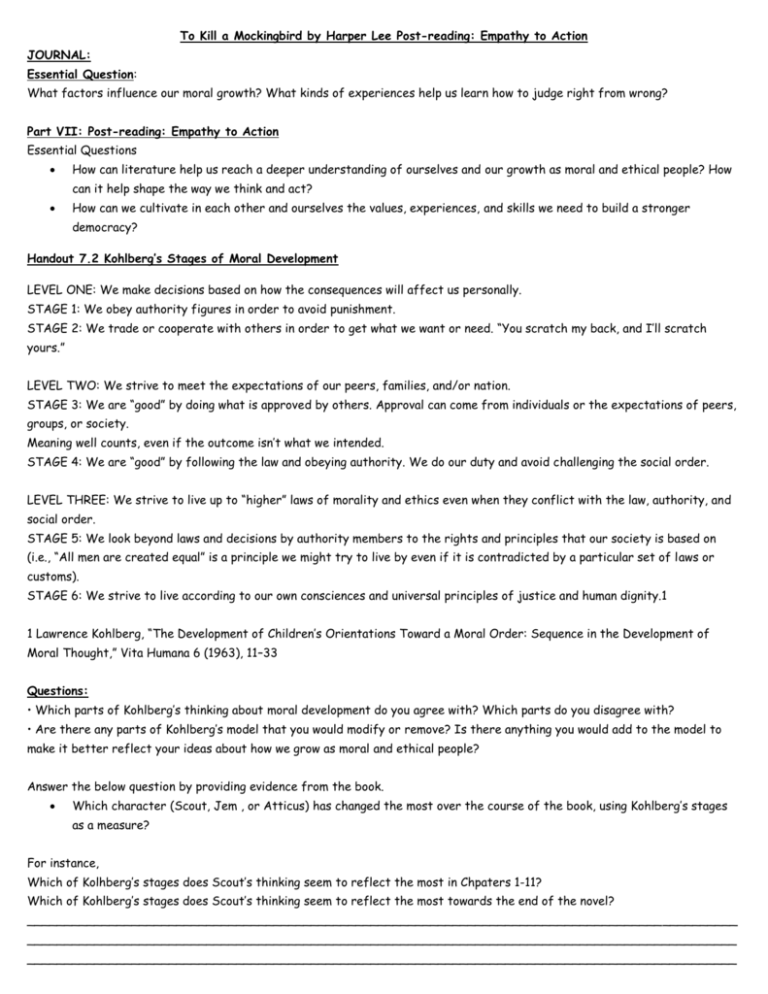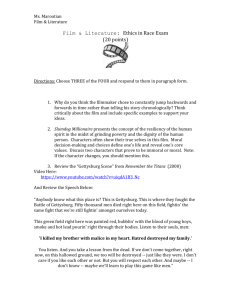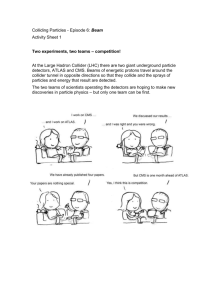Post-reading Handout
advertisement

To Kill a Mockingbird by Harper Lee Post-reading: Empathy to Action JOURNAL: Essential Question: What factors influence our moral growth? What kinds of experiences help us learn how to judge right from wrong? Part VII: Post-reading: Empathy to Action Essential Questions How can literature help us reach a deeper understanding of ourselves and our growth as moral and ethical people? How can it help shape the way we think and act? How can we cultivate in each other and ourselves the values, experiences, and skills we need to build a stronger democracy? Handout 7.2 Kohlberg’s Stages of Moral Development LEVEL ONE: We make decisions based on how the consequences will affect us personally. STAGE 1: We obey authority figures in order to avoid punishment. STAGE 2: We trade or cooperate with others in order to get what we want or need. “You scratch my back, and I’ll scratch yours.” LEVEL TWO: We strive to meet the expectations of our peers, families, and/or nation. STAGE 3: We are “good” by doing what is approved by others. Approval can come from individuals or the expectations of peers, groups, or society. Meaning well counts, even if the outcome isn’t what we intended. STAGE 4: We are “good” by following the law and obeying authority. We do our duty and avoid challenging the social order. LEVEL THREE: We strive to live up to “higher” laws of morality and ethics even when they conflict with the law, authority, and social order. STAGE 5: We look beyond laws and decisions by authority members to the rights and principles that our society is based on (i.e., “All men are created equal” is a principle we might try to live by even if it is contradicted by a particular set of laws or customs). STAGE 6: We strive to live according to our own consciences and universal principles of justice and human dignity.1 1 Lawrence Kohlberg, “The Development of Children’s Orientations Toward a Moral Order: Sequence in the Development of Moral Thought,” Vita Humana 6 (1963), 11–33 Questions: • Which parts of Kohlberg’s thinking about moral development do you agree with? Which parts do you disagree with? • Are there any parts of Kohlberg’s model that you would modify or remove? Is there anything you would add to the model to make it better reflect your ideas about how we grow as moral and ethical people? Answer the below question by providing evidence from the book. Which character (Scout, Jem , or Atticus) has changed the most over the course of the book, using Kohlberg’s stages as a measure? For instance, Which of Kolhberg’s stages does Scout’s thinking seem to reflect the most in Chpaters 1-11? Which of Kohlberg’s stages does Scout’s thinking seem to reflect the most towards the end of the novel? _______________________________________________________________________________________________ _______________________________________________________________________________________________ _______________________________________________________________________________________________ _______________________________________________________________________________________________ _______________________________________________________________________________________________ _______________________________________________________________________________________________ _______________________________________________________________________________________________ _______________________________________________________________________________________________ _______________________________________________________________________________________________ _______________________________________________________________________________________________ _______________________________________________________________________________________________ _______________________________________________________________________________________________ _______________________________________________________________________________________________ _______________________________________________________________________________________________ _______________________________________________________________________________________________ _______________________________________________________________________________________________ _______________________________________________________________________________________________ _______________________________________________________________________________________________ _______________________________________________________________________________________________ _______________________________________________________________________________________________ Connect to the Film Film versions of novels are often adaptations, made sometimes by the author of the original work and other times by a different screenwriter. In the case of To Kill a Mockingbird, screenwriter Horton Foote made changes to the characters, setting, and plot of Harper Lee’s novel. As a result, the film tells a story that is similar to but distinct from the novel. Answer the following questions during and after watching the film. 1. Which scenes in the film are most memorable to you? Are they the same scenes that are most memorable to you from the book? Compare and contrast your responses to these two different versions of To Kill a Mockingbird. _______________________________________________________________________________________________ _______________________________________________________________________________________________ _______________________________________________________________________________________________ _______________________________________________________________________________________________ _______________________________________________________________________________________________ 2. What are the most noticeable changes that Horton Foote (the screenwriter) made in his film adaptation of Harper Lee’s novel? What differences in characters, setting, and plot are most obvious? How do those changes impact the way you experience and respond to the story? _______________________________________________________________________________________________ _______________________________________________________________________________________________ _______________________________________________________________________________________________ _______________________________________________________________________________________________ _______________________________________________________________________________________________ 3. How does the film present the world of Maycomb differently from the way the book does? Which scenes in the film are pivotal in helping the viewer understand “Maycomb’s ways”? What important details about Maycomb from the book are left out in the film? _______________________________________________________________________________________________ _______________________________________________________________________________________________ _______________________________________________________________________________________________ _______________________________________________________________________________________________ _______________________________________________________________________________________________ 4. How is the way the story is told in the film different from the way it is told in the book? Compare and contrast the point of view of the book and the film. How do the differences impact what the story is about? _______________________________________________________________________________________________ _______________________________________________________________________________________________ _______________________________________________________________________________________________ _______________________________________________________________________________________________ _______________________________________________________________________________________________ 5. Who is the protagonist of To Kill a Mockingbird? Would you have answered this question differently before viewing the film version? Why or why not? _______________________________________________________________________________________________ _______________________________________________________________________________________________ _______________________________________________________________________________________________ _______________________________________________________________________________________________ _______________________________________________________________________________________________ 6. How do the differences in characters, setting, and plot in the film affect its thematic focus? Which “ongoing cultural conversations” from the book are emphasized most strongly in the film? Which ones are diminished or missing? _______________________________________________________________________________________________ _______________________________________________________________________________________________ _______________________________________________________________________________________________ _______________________________________________________________________________________________ _______________________________________________________________________________________________ Part VII: Post-reading: Empathy to Action Essential Questions How can literature help us reach a deeper understanding of ourselves and our growth as moral and ethical people? How can it help shape the way we think and act? _________________________________________________________________________________________ _________________________________________________________________________________________ _________________________________________________________________________________________ _________________________________________________________________________________________ _________________________________________________________________________________________ _________________________________________________________________________________________ How can we cultivate in each other and ourselves the values, experiences, and skills we need to build a stronger democracy? _________________________________________________________________________________________ _________________________________________________________________________________________ _________________________________________________________________________________________ _________________________________________________________________________________________ _________________________________________________________________________________________ _________________________________________________________________________________________



